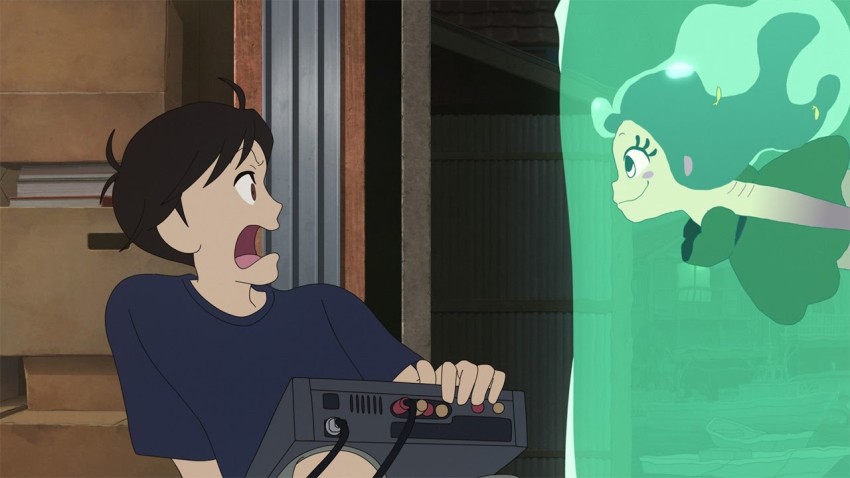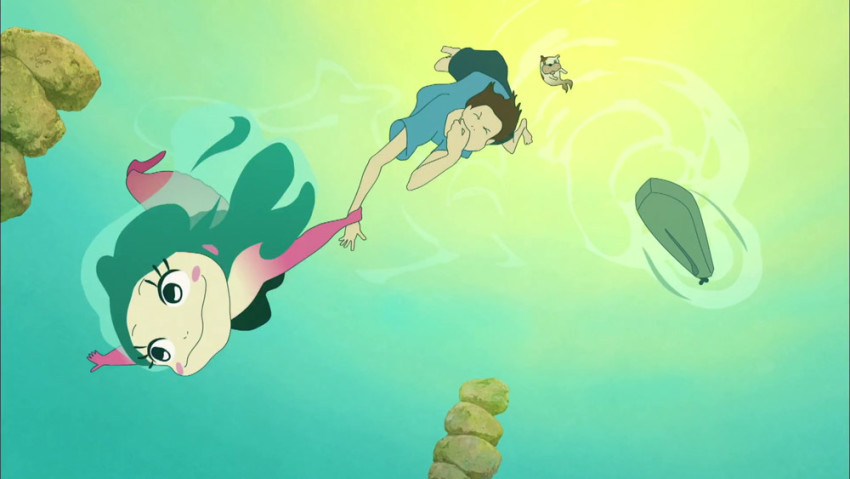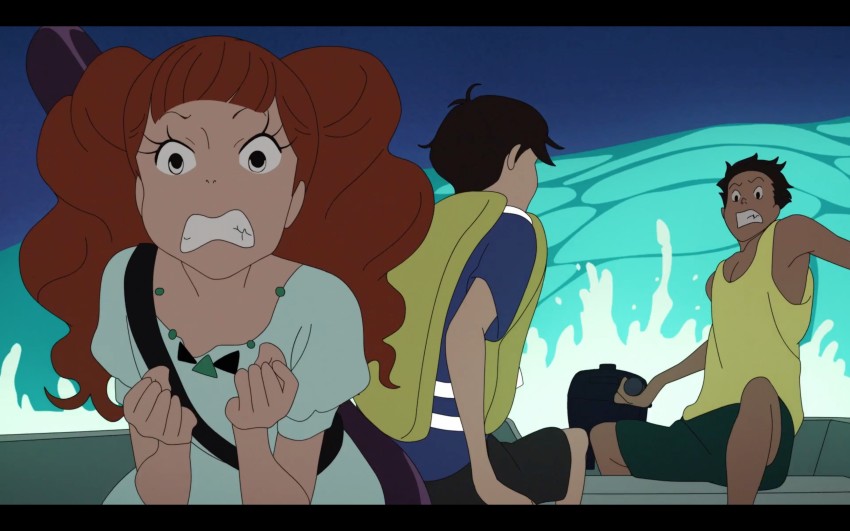Lu Over the Wall
October 2, 2017 · 0 comments
By Jonathan Clements.
 The seaside town of Hinashi (“Sunless”) takes its name from the long shadow cast over its bay by an imposing cliff, the Shadowstone. These dark waters prove to be an abundant source of fish, but also a favourable environment for merfolk, sea-monsters from many a local legend.
The seaside town of Hinashi (“Sunless”) takes its name from the long shadow cast over its bay by an imposing cliff, the Shadowstone. These dark waters prove to be an abundant source of fish, but also a favourable environment for merfolk, sea-monsters from many a local legend.
Local boy Kai is lured into joining Siren, an amateur band started by his school friends Yuho and Kunio. Determined to avoid parental disapproval, they rehearse in secret in the abandoned theme park on Merfolk Island. Their music attracts the attention of Lu, a mermaid ingénue who is soon joining in their songs. Music causes her to temporarily sprout legs, allowing her to join in their first public performance at town fair, and attracting unwelcome attention from town-hall marketers and social media.
Jealous at the attention Lu is getting, Yuho runs away, causing her family to assume that she has been eaten by the merfolk. The townsfolk apprehend Lu and prepare to subject her to sunlight, leading to a rescue attempt by her giant, shark-like father, and the activation of an ancient curse that threatens to flood the whole town.
Like the shadow cast by the looming crag, Reiko Yoshida’s script for Lu Over the Wall contains darker implications, a community in which every single member has some sort of ghost or hang-up that needs to be exorcised. Hinashi is set up as a mire that nobody can escape, a dead-end fishing village whose children inevitably return home having failed in the big city. Only the Ebina fish processing plant is prospering, and even then its patriarch, Yuho’s grandfather, lost his shirt when he tried to branch out with the Merfolk Island theme park. Of the villagers, only Kai’s mother, a dancer in Tokyo, seems to have achieved escape velocity, by abandoning him.
 Director Masaaki Yuasa likens the sunless town to apathetic modern sensibilities, in which human ambition is less overwhelmed than it is diluted by the desire not to make waves. “Before you realise it, you find yourself trying to match the expectations of those around you,” he says. “These days it feels like if you stray from the norm or try a direction deemed risky, you get so many haters quoting ‘expert opinion’ that it’s impossible or telling you to come back or change your ways. You try to march on, but they are hanging onto your legs, pulling you back. The arrival of the mermaid Lu opens the heart of a boy who has been trapped by this kind of curse.”
Director Masaaki Yuasa likens the sunless town to apathetic modern sensibilities, in which human ambition is less overwhelmed than it is diluted by the desire not to make waves. “Before you realise it, you find yourself trying to match the expectations of those around you,” he says. “These days it feels like if you stray from the norm or try a direction deemed risky, you get so many haters quoting ‘expert opinion’ that it’s impossible or telling you to come back or change your ways. You try to march on, but they are hanging onto your legs, pulling you back. The arrival of the mermaid Lu opens the heart of a boy who has been trapped by this kind of curse.”
Low expectations hound the whole cast. Yuho is stifled by her role as the Ebina heiress. Kunio is fated to become the local Buddhist priest, but would rather be in a band. Kai’s own father has a box full of old tapes in the garage, from when he, too, once dreamed of a career in music. Kai’s meeting with Lu, it seems, sets in motion a chain of events that will cause everyone to find a renewed hope in the future, or at least to come to terms with the past.
“I think that if you tell yourself you can do it, you probably can,” says Yuasa, in his variant of Disney positivism. In his film, he applies it directly to the mechanics of swimming, and the odd factoid that humans can drown even though they can also naturally float. “People are strange, because if they believe they will sink, they tense up and drop below the surface. But if they think they can float, they relax and bob along. It’s strange, but it also makes sense. Taking things further, if you stop worrying and take things as they come, you’ll get to where you’re going before you know it.” Not by chance, this is also the message of Kazuyoshi Saito’s ‘A Singer’s Ballad’, the much-covered 1997 oldie that closes out the film, a garage-band anthem that proclaims doing something, however raw, is better than never doing anything. It’s also the song that Kai, played by the 14-year-old Shota Shimoda, tries to belt out. “He shouts with all he’s got,” notes Yuasa, “and you can really feel it, deep down. We could have gone with other, more experienced voice actors, but he brings a real junior-high realism to the role that you just couldn’t get with someone older.”
Mermaid stories, of course, have a rich tradition in both European and Japanese folklore, and Lu plays to the home crowd by fixating on the more visceral elements of the eastern variants – in a vampiric twist, the bite of a mermaid will turn you into one, but turning into one makes you allergic to sunlight. However, it takes a certain glib bravado to make a Japanese mermaid film so soon after Studio Ghibli’s Ponyo (2008). While nine years is a long time in children’s media, the teenage protagonists of Lu make it likely that the intended audience will be well aware of its cinematic predecessor.
 But Ponyo was itself a variation on a theme at least as old as Hans Christian Andersen’s Little Mermaid. And Yuasa does not regard Lu as a specifically teen movie, but a family feature. “I want the little kids to come to this for Lu and her father. For older kids, the take-away is the joy of hanging out with their friends, and the sensation of a whole world opening up ahead, of songs and dances. Parents in the audience, I am sure, will understand how Kai’s father feels. And if you are a grandfather or a grandmother…” he pauses, considering for a moment, “there’s a chance to think back on past loves!”
But Ponyo was itself a variation on a theme at least as old as Hans Christian Andersen’s Little Mermaid. And Yuasa does not regard Lu as a specifically teen movie, but a family feature. “I want the little kids to come to this for Lu and her father. For older kids, the take-away is the joy of hanging out with their friends, and the sensation of a whole world opening up ahead, of songs and dances. Parents in the audience, I am sure, will understand how Kai’s father feels. And if you are a grandfather or a grandmother…” he pauses, considering for a moment, “there’s a chance to think back on past loves!”
True to his trademark form, as seen in acclaimed works such as Ping Pong and Mind Game, Yuasa eschews realism in favour of false colours, abstract visions and forced perspectives, with some quirky, absurdist asides such as a subplot involving zombie fish, and the conferral of merfolk status on an entire dog-pound of lost puppies, creating a tide of self-consciously cute mascot characters.
This clash of perspectives comes out in the animation, in which scenes of everyday life are depicted with meticulous attention to mundane detail, while the action scenes are a riot of deformation and surrealism. Yuasa’s crew made the entire film in Flash, animation software that relies on point-based coordinates, allowing for extremely smooth transitions between frames. “Water’s tough to animate because it’s always fluid,” says Yuasa, “but Flash’s real advantage is a smoothness of movement and a clarity of line. So it’s ideal for showing small objects growing ever-larger in size while maintaining their original form, or for constantly mutable forms like water.”
 However, Yuasa’s anti-realism also seems to infect the narrative, demanding that the viewer accept a town that has centuries of history with the merfolk, but has never quite realised that they might be friendly; that has an entire book of legends about them, but is ignorant of their powers and abilities. Yuasa counters that the merfolk have not previously been friendly at all, and that Lu’s imposing father is only a reluctant convert to friendship with humans. “When he realises that Lu wants [to be friends], he stops himself from eating humans and tries to mimic a human lifestyle… The way he gives up eating people for the sake of his child is kind of like how people quit smoking so as not to set a bad example for their kids.”
However, Yuasa’s anti-realism also seems to infect the narrative, demanding that the viewer accept a town that has centuries of history with the merfolk, but has never quite realised that they might be friendly; that has an entire book of legends about them, but is ignorant of their powers and abilities. Yuasa counters that the merfolk have not previously been friendly at all, and that Lu’s imposing father is only a reluctant convert to friendship with humans. “When he realises that Lu wants [to be friends], he stops himself from eating humans and tries to mimic a human lifestyle… The way he gives up eating people for the sake of his child is kind of like how people quit smoking so as not to set a bad example for their kids.”
Possibly with satirical intent, the Hinashi town council is more excited at the promotional and merchandising prospects of a real-life mermaid than its world-changing implications for zoology or politics. Miyazaki dodged such considerations in Ponyo by resolutely framing his entire narrative in terms only a child could comprehend. Yuasa’s characters, on the other hand, are rooted firmly enough in the real world to be bickering about lucky gonks and T-shirts, making them, like the heroines of Takayuki Hirao’s Little Witches Yoyo and Nene (2013) post-modernly self-aware about their existence within a media mix of marketing and tourism.
Although the execution is a world away from Miyazaki’s Ponyo or Hiroyuki Okiura’s Letter to Momo, far too many elements of Lu seem actionably similar, up to and including the magic-realist final-reel inundation. But Yuasa extends his watery themes deep into the film’s subtext, regarding Hinashi as a town steeped in its own stagnation, its population afraid to rock the metaphorical boat, even though it is already sinking. “If you’re just bailing out,” says Yuasa, “then you’re eventually going to sink where you are anyway. The only solution is to pick a destination and head for it. Where do you want to go? What place is going to make you happy…? Don’t worry about the boat sinking, just pick a target and start rowing. Even if it sinks, you can still swim, and rest, and swim again. You can make it. Once you truly believe in your abilities, you can make it through. That’s the kind of inspirational film I wanted to make.”
Lu Over the Wall is screening in competition at this year’s Scotland Loves Anime and also screening at the London Film Festival.
Leave a Reply